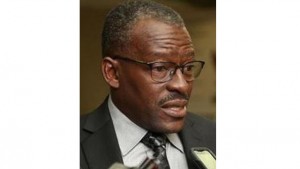
National Security Minister Edmund Dillon
PORT OF SPAIN, Trinidad — There are now 89 Trinidad and Tobago nationals — including families — known to the government who have joined the Islamic State of Iraq and Syria (ISIS) in the last three years, local media reported.
That is the most up to date figure given by government on Saturday morning, shortly after deadly terrorist attacks on Paris claimed 129 victims, and left 350 wounded. ISIS has claimed responsibility. However, according to US intelligence sources, the number of Trinidadians that have joined with ISIS could be closer to 130.
Former national security minister Gary Griffith and former National Operations Centre head Garvin Heerah were among experts who have come out in support of laws to block Trinidad and Tobago-born foreign terrorist fighter returnees on their way back, well before they reach the Caribbean country.
Muslim community leader attorney Nafeesa Mohammed also urged rapport between government agencies and the fragmented leadership of the local Muslim community to ascertain who has gone to ISIS and why, so “innocent” people wouldn’t suffer.
National Security Minister Edmund Dillon was quoted on Sunday as saying ISIS poses “no threat to T&T right now” and there’s no law to stop the Trinidad and Tobago nationals returning. He said if they’d committed international crimes, the government could work with foreign partners to bring them to justice, but “for now they’re still T&T citizens”.
However, Dillon said on Sunday that authorities are monitoring returnees.
On the reported 89 nationals with ISIS, Dillon said there are 80-plus, including some 35 men and other family members. He said several of the Trinidadian fighters have been killed.
According to assessments earlier in the year from intelligence sources, a number of those who had gone to join ISIS were from Trinidad and Tobago’s criminal fringe element, rather than Muslim activists, Dillon said that assessment was still valid.
Dillon said that he was aware of laws that block returning foreign terrorist fighters in other countries before they reach Trinidad and Tobago.
Antigua and Barbuda’s ambassador to the US, Sir Ronald Sanders, warned last week that the Caribbean region should not linger in the false notion that small countries are immune from the conflicts that engulf larger and more powerful states.
“My worst nightmare for our idyllic islands of the Caribbean is that the tactics of terror so casually utilized by extreme groups such as the Islamic State (ISIS) will be deployed within them,” Sanders said.
The United Nations had also warned that Trinidad and Tobago is one of a number of countries with Muslim populations that is being used as a recruiting ground for the terror group.
